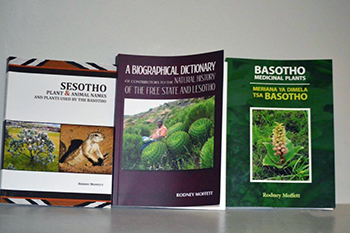Latest News Archive
Please select Category, Year, and then Month to display items
06 April 2018
Photo Rulanzen Martin
 From the left: Dr Thulisile Mphambukeli, leader of the BRICS research team that is exploring the political economy of water and food security, and her research partner, Dr Victor Okorie.
From the left: Dr Thulisile Mphambukeli, leader of the BRICS research team that is exploring the political economy of water and food security, and her research partner, Dr Victor Okorie.
A Brazil, Russia, India, China and South Africa (BRICS) delegation is to hold the 10th Annual BRICS Summit in the last week of May 2018 in Johannesburg. Dr Thulisile Mphambukeli, leader of the University of the Free State (UFS) research team alongside Dr Victor Okorie from the Department of Urban and Regional Planning, in collaboration with Prof Lere Amusan of North-West University, will ensure that water and food security is a prominent feature on the gathering’s agenda.
First, the project titled: “Exploring the political economy of water and food security nexus in BRICS and Africa” will debut at the National Institute for the Humanities and Social Sciences BRICS Think Tank Forum”.
According to Dr Mphambukeli, the key to water security is attitudinal change by means of education and conscientisation. This, she is adamant about, holds the potential to drive behavioural adjustments in the way society interacts with water.
Genetic and social approaches
Dr Okorie asserts that if strides towards reducing the demand for water were to be made, research efforts should be geared towards effecting changes at DNA level. Meaning we need to explore waterwise ways that enable crops and animals to thrive optimally.
The project also looks at social dimensions of water such as flushing a toilet. “Research activities on redesigning toilets, especially the urinal, where more than nine litres of water are used to flush less than one cubic centimetre of urine, are timely in the context of managing water and the food nexus crises,” said Dr Okorie.
Combining the genetic and social approaches would allow us to produce more with a smaller water footprint. This can be made possible by implementing precision agriculture which is about estimating and applying exact quantities of water and nutrients needed for the production of crops or the raising of livestock.
Paradigm shifting policies
Prof Amusan said the team intended to propose functional solutions that take the quality of water into consideration. Equitable production and distribution of water depends on endorsing policies of co-production between citizens, governments and the public sector. BRICS member states mutually consider water and food security as an issue of paramount significance, hence its feature on this prestigious summit’s agenda.
Prof Moffett’s third book provides comprehensive guide to Basotho medicinal plants
2017-07-26

Prof Rodney Moffett’s three books documenting Basotho
plants, animals, and the history of the Free State and Lesotho.
Photo: Thabo Kessah
Prof Rodney Moffett has recently published his third book, Basotho Medicinal Plants – Meriana ya Dimela Tsa Basotho. This latest offering deals only with medicinal uses and is based on the data from his first book, Sesotho Plant and Animal Names and Plants Used by the Basotho.
“The latest book came about after a Sesotho language advisor in the Free State Department of Education suggested that there was a need for the medicinal uses of plants by the Basotho to be documented in the vernacular. In a situation where there is an almost total lack of scientific literature in the vernacular, the greatest value of this book therefore, is that it provides a comprehensive guide to the medicinal uses of plants in Sesotho,” said Prof Moffett, Honorary Research Associate in the Department of Plant Sciences on the Qwaqwa Campus.
Book lists names of plants in Sesotho
“It comprises two parts. Part one lists the medicinal categories and plants used, and part two lists the medicinal uses arranged according to the Sesotho names of the plants. It is easy to read, as the information is presented alphabetically with the Sesotho name first, followed by the scientific name and usage thereof. Because a plant often has more than one Sesotho name, the scientific name is included to identify it.”
Prof Chris Nhlapo, Deputy Vice-Chancellor of the Cape Peninsula University of Technology, and Prof Ntsamaeeng Moteetee from the University of Johannesburg are impressed with the book, respectively saying that it assists in documenting the deep indigenous knowledge of the “proud tradition of the Basotho Nation” and it is “an important contribution to the documentation of medicinal plant uses”.
The title of Prof Moffet’s second book was A Biographical Dictionary of Contributors to the Natural History of the Free State and Lesotho.
Prof Moffett was honoured with a Lifetime Researcher Award during the Academic and Research Awards on the Qwaqwa Campus in November.